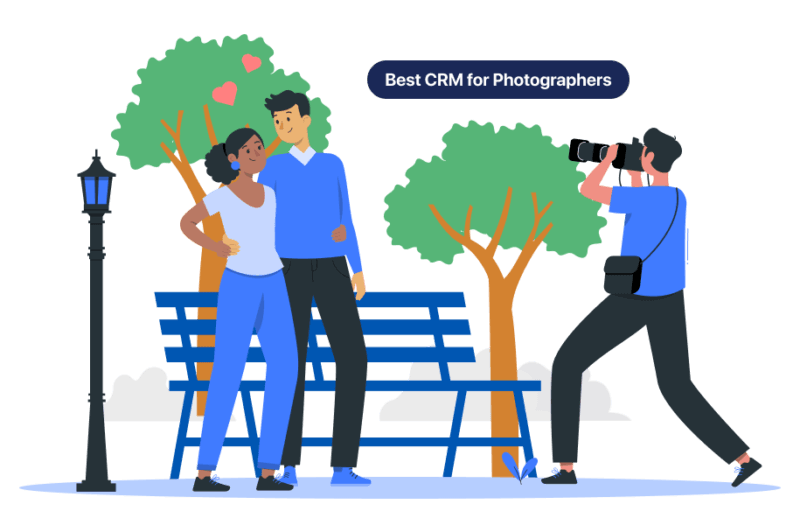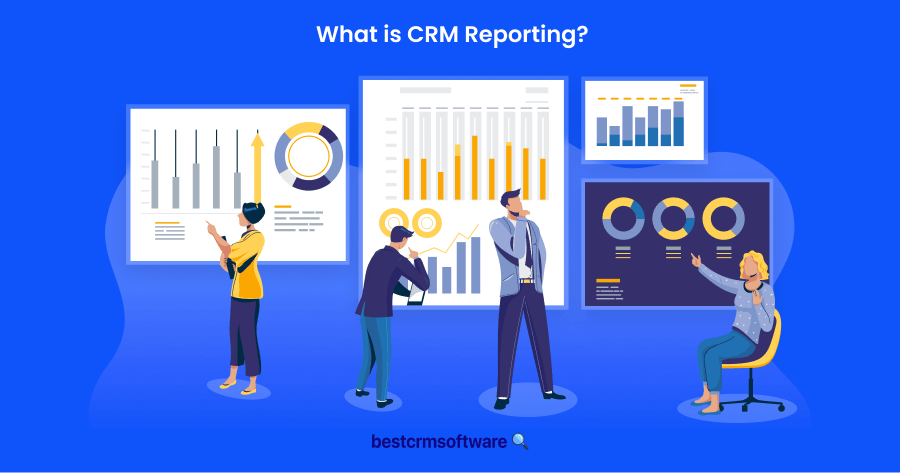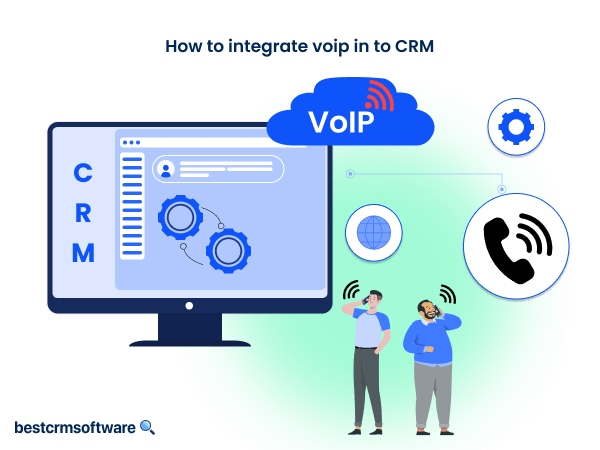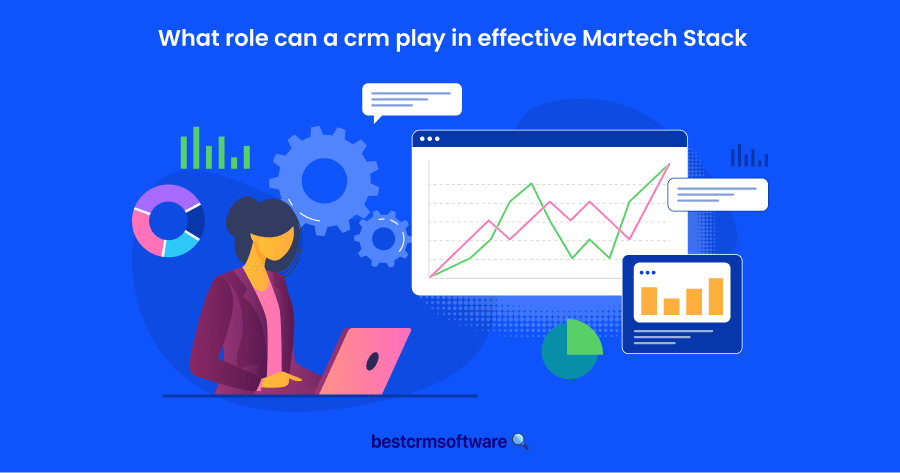
Best CRM Software for Photographers
In a Nutshell
I’m deeply invested in streamlining client relationships so I’ve meticulously explored the CRM landscape to identify the most fitting solutions. After thorough testing and evaluation, I’ve narrowed down the options. I’ll unveil the top platforms for photographers in 2024. These tools are adept at managing inquiries, scheduling shoots, and facilitating seamless communication. They empower photographers to focus more on capturing unforgettable moments.
10 CRM Tools for Photographers:
- ShootQ: Best overall
- Studio Ninja: Best for managing photography leads
- HoneyBook: Best all-in-one for photographers
- Dubsado: Best for small photography businesses
- Sprout Studio: Best for managing workflows
- Pixifi: Best for automation
- 17hats: Best for billing
- HubSpot: Best for integration
- Bonsai: Best for client portal
- ShootZilla: Best for streamlining operations
In the world of photography, staying organized with clients is crucial. As a photographer, I’ve tried out several CRM platforms. Some of the ones I’ve listed here are great because they link seamlessly with photography platforms which makes it easy to import client details.
The best part? They also help with communication. I can send personalized emails and reminders without any hassle. Tracking inquiries, bookings, and payments is straightforward, giving me more time for photography.
But, like anything, they can have their downsides. Setting up custom workflows took me a bit of time to figure out, but once I got the hang of it, it worked like a charm.
Why Photographers Need CRM Software
I rely on CRM software to streamline my operations and enhance client communication. Without it, tasks like sending invoices and managing inquiries can become overwhelming.
CRM systems automate these processes. They free up my time for creativity and business growth. Whether you’re a start-up or an established business, it doesn’t matter – investing in CRM software ensures readiness for future growth.
Key features like automated emails and payment integration are essential for efficiency and consistency in client interactions. Despite the many affordable options, finding the right CRM to suit your needs and budget is still achievable.
CRM software is more than a tool. It’s a game-changer for photographers. Investing in the right one can elevate efficiency, organization, and success.
Top 10 CRM Systems for Photographers
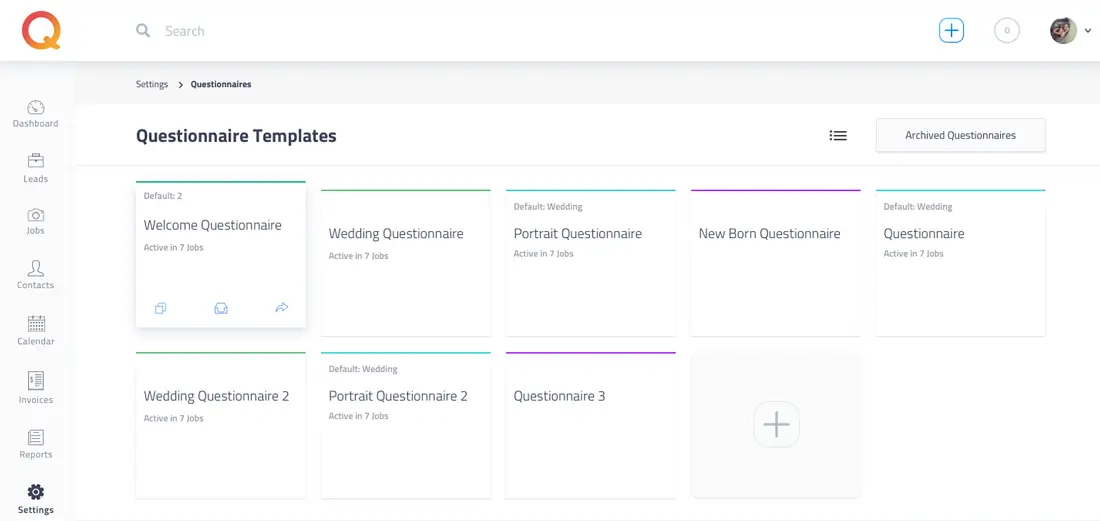
Why I Like It
In my experience, ShootQ is a comprehensive CRM. It’s tailored specifically for photography businesses, offering many features. Those features streamline workflows and enhance client communication. Its robust automation tools save time and effort, allowing photographers to focus on their craft.
Key Photography Business Features
Lead Management
Capture, track, and convert leads into clients through customizable pipelines.
Workflow Automation
Automate tasks such as scheduling, contract signing, and payment reminders.
Client Portal
Provide clients access to contracts, invoices, and galleries in a secure online portal.
Calendar Integration
Synchronize appointments and events with your Google or Outlook Calendar.
Pros
- Extensive feature set
- Advanced reporting and analytics
- Integration with popular photography software
Cons
- Steeper learning curve
- Outdated interface
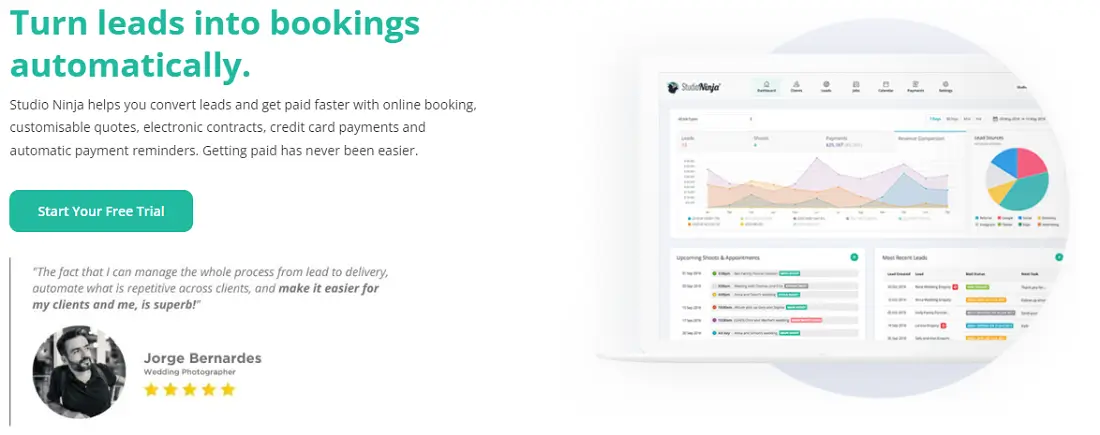
Why I Like It
For me, Studio Ninja excels in simplifying business management for photographers – especially those with busy schedules. Its comprehensive features for invoicing, payments, and statistics empower me to efficiently track and grow my businesses.
Key Photography Business Features
Invoicing & Payments
Easily manage invoices and track payments, keeping financials organized and up to date.
Statistics & Analytics
Gain insights into business performance, enabling informed decisions for growth and improvement.
Automation
Set up workflows to automate repetitive tasks, saving time and effort.
Exceptional Onboarding & Support
Enjoy a smooth transition into using Studio Ninja with outstanding onboarding and ongoing customer support.
Pros
- Easy setup & support
- Saves time with automation
- Simple to use interface
- Regular software updates
Cons
- Sometimes encounters errors
- Doesn’t handle multiple currencies
- Limited options for email automation

Why I Like It
For me, HoneyBook is an all-in-one client management tool tailored for photographers and other independent business owners. It offers essential features for managing a photography business efficiently.
Key Photography Business Features
Invoices & Payments
Generate professional invoices and receive online payments smoothly. Reduce administrative burdens and ensure timely payments.
Proposals & Contracts
Customize and electronically sign professional contracts and proposals. Safeguard your services and clearly outline terms for clients.
Scheduling
Offer clients a personalized scheduling link synced with your calendar. Thus simplifying the booking process.
Workflow Automation
Automate tasks and communications triggered by specific events. This will save time and maintain a consistent client experience.
Pros
- An all-in-one tool for streamlining tasks
- Customizable workflows
- User-friendly interface
- Receive online payments
Cons
- No free tier
- Lacks features
- Reporting options are basic

Why I Like It
It offers one of the best CRM for the small business photographer. Its intuitive interface, robust features, and unparalleled customer service cater to the unique needs of solopreneurs and small teams in various industries.
Key Photography Business Features
Client Portals
Impress clients with mobile-friendly portals for accessing invoices and more, enhancing professionalism.
Transparent Pricing
No payment processing fees ensure photographers keep more earnings and save on costs.
Unbeatable Customer Service
Access top-quality support via chat, email, or phone, and join a vibrant community for inspiration.
Automation & Templates
Streamline operations with automated tasks and customizable templates, saving time and energy.
Pros
- Automated emails save time on communications
- Cost-effective with comprehensive features
- Excellent customer service & community support
- Automation for consistent client experiences
Cons
- Occasional issues with events & invoices
- UI could be more dynamic
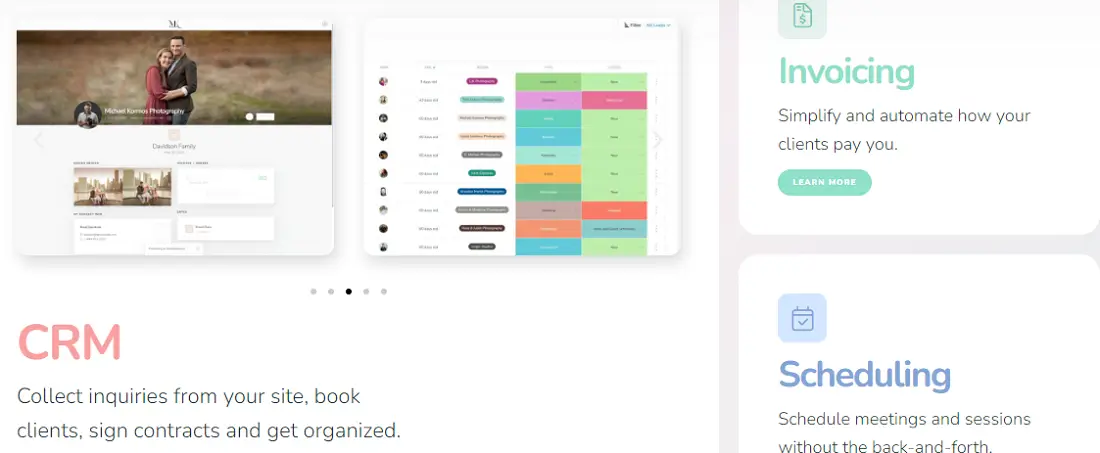
Why I Like It
In my view, Sprout Studio offers a comprehensive studio management system. It caters specifically to photographers, providing a clean and simple interface. Moreover, the CRM provides powerful features. Its client portal functionality and customizable workflows make it a standout choice for photographers seeking to streamline their business operations and enhance the client experience.
Key Photography Business Features
Client Portal
Impress clients with a centralized hub for contracts, galleries, invoices, questionnaires, and more.
Workflows
Automate tasks and communications with intuitive workflows.
Galleries
Showcase images alongside other client materials.
Fantastic Customer Support
Access top-quality customer support and comprehensive tutorials, ensuring a smooth experience and quick issues resolution.
Pros
- Clean user interface
- Intuitive workflows
- Consolidated functionality
- Great customer support
Cons
- Steep initial learning curve
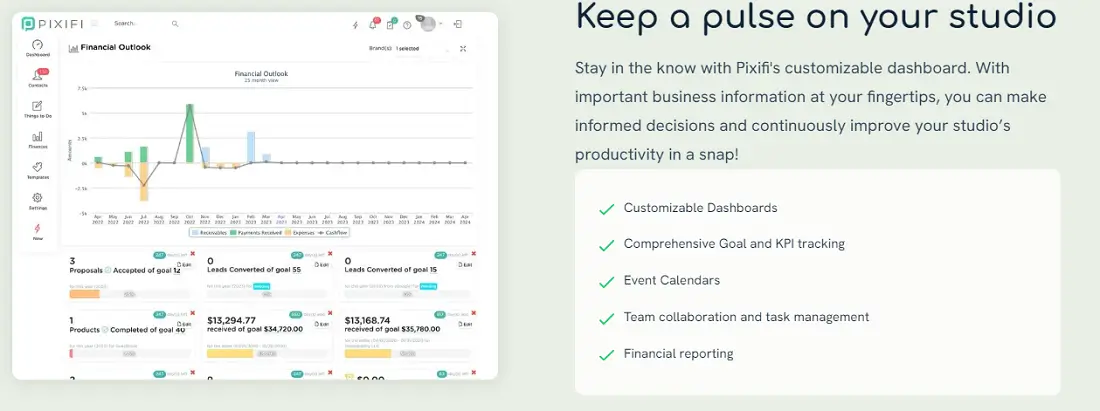
Why I Like It
For me, Pixifi stands out as a top choice due to its robust features and customizable workflows. It offers a comprehensive solution for photographers, addressing key business needs while providing automation and strong support systems.
Key Photography Business Features
Distinct & Customizable Workflows
Pixifi’s distinct, customizable workflows cater to various business types, offering automation for emails, questionnaires, invoice reminders, and contracts.
Seamless Automation for Client Interaction
Thanks to seamless automation, clients can effortlessly sign contracts and view invoices while making their booking on the preset calendar. Online questionnaires are also part of the flow, so the client’s experience is consistently convenient and organized.
Comprehensive Online Client Portal
Pixifi boasts an array of powerful features, frequent updates, and robust online support via a dedicated Facebook group.
Pros
- Incredibly powerful software with comprehensive features
- Continuous updates & excellent online support
- Time-saving automation features for clients and photographers
- Customizable workflows tailored to specific business needs
Cons
- Significant learning curve
- Time-consuming setup process
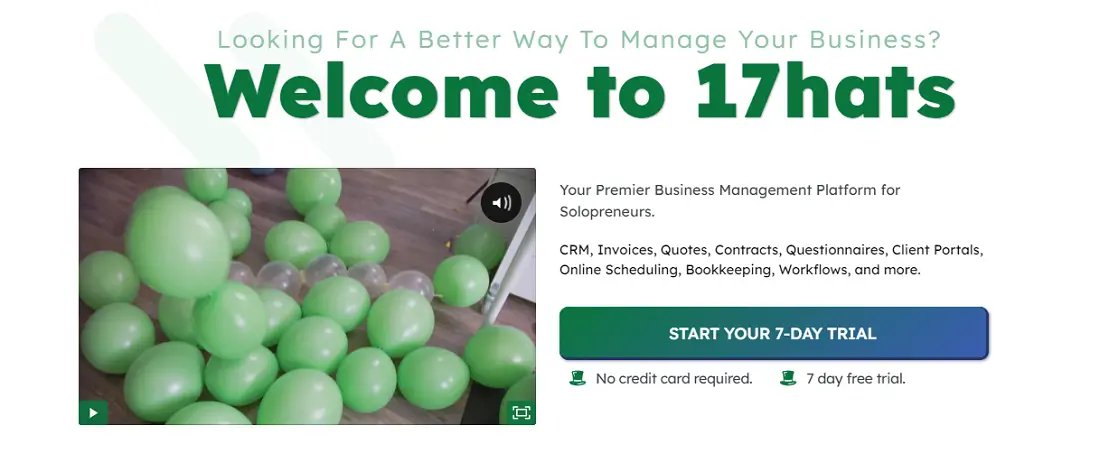
Why I Like It
17hats is an ideal solution for photographers. It offers a comprehensive set of tools including customizable lead inquiry forms, automated workflows, and a centralized dashboard. These all combine to simplify client management and enhance productivity.
Key Photography Business Features
Customized lead inquiry forms
Enables more precise assessment of prospects.
Automation
Set up automatic workflows for tasks such as creating quotes and sending reminders.
Centralized dashboard
Great for organizing client communications, proposals, contracts, and payments.
Google Integration
Integrates seamlessly with Google Calendar for appointment synchronization.
Financial tracking
Excellent for efficiently managing invoices and client payments.
Pros
- Automated workflows
- Convenient financial tracking
- Create and store templates
- Seamless integration with other apps
Cons
- Difficult to pull financial information
- Lack of clarity

Why I Like It
Based on my extensive research, HubSpot has various features that are suitable for businesses of all sizes and industries. It’s one of the best simple CRMs for photographer platforms. It simplifies lead nurturing and tracking, and provides analysis for B2B and B2C businesses.
Key Photography Business Features
Lead tracking & nurturing
HubSpot allows photographers to track and nurture leads throughout the sales pipeline.
Real-time sales pipeline management
Photographers can monitor their sales pipeline in real-time.
Contact & lead management
The CRM provides robust contact and lead management tools.
Email campaigning & tracking
Photographers can create personalized email sequences for leads and existing customers.
Integration with third-party calendars
HubSpot seamlessly integrates with popular calendar tools.
Pros
- Free CRM software
- Real-time lead notifications
- Personalized email sequences
- Integration with 500+ apps
Cons
- Expensive per-user plans
- Daily email sending limits

Why I Like It
Bonsai offers an all-in-one product that appears to cater for everyone from small agencies and solopreneurs to freelancers and contractors. It streamlines workflow management starting with proposals and scheduling to invoicing, through task management, and ending with tax preparation.
Key Photography Business Features
Proposals, contracts, & invoice templates
Bonsai provides customizable templates for contracts, proposals, and invoices.
Streamlined client management
Bonsai simplifies client management, offering features such as scheduling.
Quick & responsive customer support
Bonsai’s customer support team is known for being quick and responsive and providing timely assistance whenever freelancers encounter issues or have questions.
Scheduling & client portal
Bonsai’s scheduling feature and client portal allow freelancers to seamlessly manage appointments, share invoices, and upload files.
Pros
- Easy to use
- Professional templates
- Responsive customer support
Cons
- Delayed payment processing
- Accounting feature limitations
- Limited client portal engagement
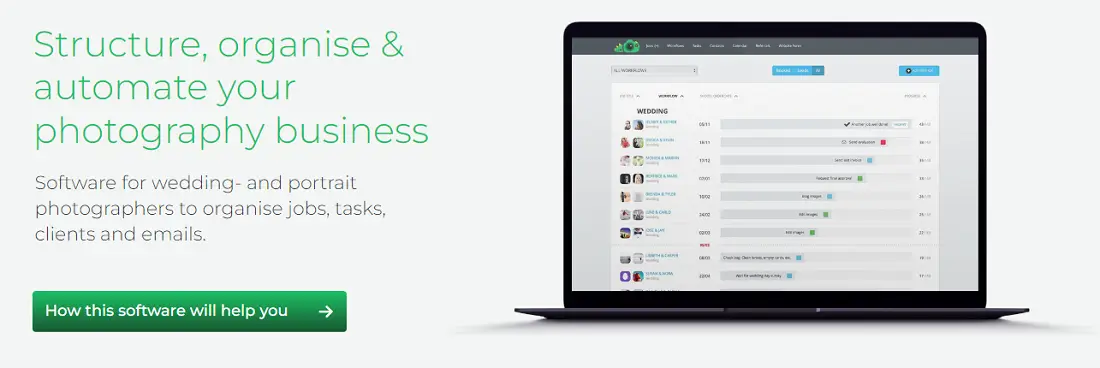
Why I Like It
ShootZilla offers one of the best CRM software for wedding photographers. It allows them to manage their studios efficiently and provides clear visual overviews, customizable workflows, and streamlined communication tools.
Key Photography Business Features
Contact list management
ShootZilla helps photographers organize their contact lists and gain a visual overview of their work tasks.
Workflow customization
Photographers can customize workflows according to their preferences.
Booking management
ShootZilla enables photography professionals to handle bookings seamlessly.
Cloud-based deployment
With cloud, SaaS, and web-based options, ShootZilla provides flexibility and accessibility.
Pros
- User-friendly interface
- Good customization options
Cons
- Complicated setup
- Steep learning curve
- Limited offline functionality
Criteria for Selecting the Best CRM for Photography Businesses
When selecting the best CRM for new photographers, it’s crucial to establish clear criteria. This will allow you to install various solutions effectively. Here are some key factors to consider.
Lead Management
I suggest you look for a CRM with robust lead management features. It’ll allow you to capture, track, and nurture leads effectively. Ensure the CRM provides lead scoring and segmentation tools. It should prioritize and target high-quality leads.
Pipeline Visualization
Choose a CRM with intuitive pipeline visualization capabilities. It should provide an overview of your sales process. Look for customizable pipelines that allow you to tailor stages to fit your photography business’s unique workflow.
Contact Engagement
Opt for a solution that facilitates seamless contact engagement. It can do it with automated email campaigns, personalized messaging, and task reminders. Ensure the CRM offers tools for tracking client interactions and engagement metrics. That way, you can gauge the effectiveness of your communications.
Integration Capabilities
Consider the app’s integration capabilities with other essential tools and platforms used in your business. These normally include email marketing software, accounting software, and project management tools. Look for pre-built integrations or APIs allowing easy connectivity and data exchange between systems.
Scalability
I always evaluate the scalability of a photographer CRM. That way, you can ensure it will accommodate your photography business’s growth over time. Look for flexible pricing plans and features that can scale with your business needs. Some features to seek out are:
- Increased storage
- User licenses
- Advanced functionalities
Security
Look for solutions focusing on data security. They should offer robust encryption, authentication, and access control measures. That way, you can be sure the software protects sensitive client information. Look for compliance certifications and adherence to industry data security standards and regulations, such as GDPR or the various US State regulations.
Compliance with Data Protection Regulations
Ensure the CRM solution complies with relevant data protection regulations applicable to your business in your location. Depending on your market, you should consider each US State’s data protection and privacy regulations. If you market to customers in the European Union), you need to comply with the General Data Protection Regulation (GDPR).
Considerations for Small vs. Large Companies
The criteria for choosing studio management software varies for small and large companies. Small businesses prioritize affordability, ease of use, and scalability to accommodate growth. They need a solution that offers robust features. Plus, they need to carefully consider their budget. Additionally, their teams need to be able to adapt to the various tools quickly.
In contrast, large companies focus on scalability, customization, and integration capabilities. They require a solution that can handle complex workflows, large volumes of data, and integration with existing systems. Customizability is crucial so businesses can align the software with specific business processes and industry requirements.
Another factor is that large companies often have dedicated IT teams. They manage the implementation and provide ongoing support, enabling them to leverage more advanced features and functionalities.
Conclusion
The best photographer CRMs can improve a photography business’ efficiency to different degrees, so it’s important to consider the cost and impact on your business when considering the options. A good idea is to sketch out your current workflows and write down your pain points so you can easily compare how each CRM can support you and your team.
Earlier we discussed data privacy regulations. It’s essential that you consider the regulations applicable to your customers’ jurisdictions. Falling foul of them could have a devastating impact on your business, but a top CRM will be able to support you with that.
The key takeaway is that you should take your time to ensure you get your CRM selection right the first time, and this guide is a great start in the right direction!

